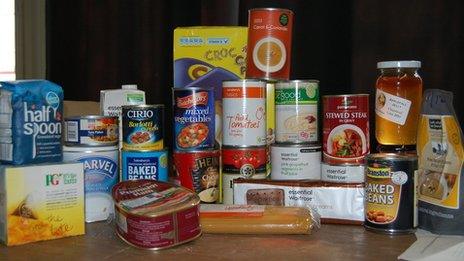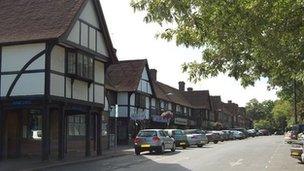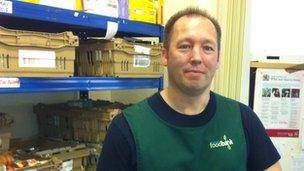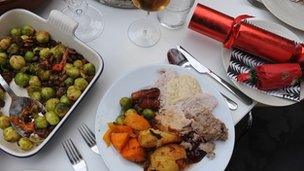Food bank charity: Christmas 'bleak on breadline'
- Published

A three-day food box for a single person includes cereal, soup and pasta
Food banks across the UK expect to feed 15,000 people over two weeks this Christmas - compared with 8,454 last year.
Numbers of people fed by food bank charity The Trussell Trust have risen steadily each year since the economic downturn in 2008.
In 2008-09, the Trussell Trust fed 26,000 people. By April, it expects to have fed 230,000 for the year 2012-13.
The organisation has warned that Christmas is looking bleak for many families on the breadline.
In Surrey, organiser of the Addlestone food bank Sam Stapley said: "We are getting busy, no doubt about that. We are generally seeing more people and this is going to carry on into next year as the cuts bite."
She said there were financial pressures at Christmas, but many people were generally finding things hard, as they had their hours cut or lost their jobs.

The Addlestone food bank operates in what is perceived to be a wealthy area of the country
The Addlestone food bank, which also expects to expand to Englefield Green next year, operates in what is perceived to be a wealthy part of the country.
Addlestone is less than five miles (8km) away from Virginia Water, which last year had the most expensive residential street outside London and is home to the Wentworth Estate where house prices top £5m.
One local restaurant manager, who asked not to be named, said he had seen people drink Cristal Champagne with a bowl of pasta mid-afternoon in a suburb he described as "very affluent" and where people who historically had money still had money.
And businesses have also weathered the recession in the area.
Kate Kennedy, who owns Wentworth Patisserie with her daughter and sister, said their 20-year-old business had been hit by rising costs and a lower spend-per-head during the recession but had still grown, because of its location.
"We are lucky. This is a lucrative area and that's what keeps us busy," she said.
But Ms Stapley said some people who had been helped by the food bank had been business-people who saw their companies fail.
"People make one or two bad decisions and they end up having to go bankrupt," she said.

Wayne Welbourne signed on and suffered a breakdown before turning to a food bank for help
"A year or so ago they would never have dreamed they would find themselves in a food bank. It's very humiliating."
Divorced father Keith Collett saw his gardening work dry up during the downturn.
As a single father with part-time custody of his son, he had already fought through 12 years of battles for custody, tax credits and benefits and had also battled depression by campaigning for Fathers for Justice, before he turned to Addlestone food bank for help.
He said he economised by eating "the basics, cheap food and noodles" and looking out for supermarket deals.
"There are certain things I don't compromise on, such as coffee and goats' milk," he said.
In Lincolnshire, Wayne Welbourne, 42, of Grantham, ran his own cleaning business and employed 10 people at its peak, before the loss of a key council contract in 2010 and a slow-down in trade led to him signing on and suffering a breakdown.
The father-of-four said: "It got to the point where the mortgage, gas, water and electric were the only things getting paid."

The Trussell Trust said rising food prices and heating costs have left Christmas "looking bleak" for many
Eventually, the Citizens Advice Bureau (CAB) gave him a voucher for the Grantham food bank, also run by the Trussell Trust.
He said: "The blow to my pride felt a bit like being punched in the gut."
He said he had tried to get back into work by volunteering for the Probation Service, the Lincolnshire Action Trust and an adult learning centre.
"Hopefully, it will show I've not just been a couch potato," he said.
"I've got out there to try to meet people, get on with life and try to succeed again."
The Grantham food bank helped more than 1,300 people - including 400 children - in its first year.
Co-ordinator Brian Hanbury has been looking for a bigger building to expand.
He said: "The situation out there is getting worse. Food prices are going up, rent is going up, wages seem to be going down."
But he said: "If we're going through a hard time we need to grow as a community and pull together. It's wartime all over again."
Trussell Trust chairman Chris Mould said: "As cold weather sets in and energy bills start to bite, more people are turning to food banks because they cannot afford both food and heating.
"Despite the official end to recession, this winter is looking particularly bleak as food and energy prices rise whilst incomes remain static."
He said food banks were meeting parents who were worried about putting food on the table this Christmas, and who could not afford any presents for their children.
Mr Mould said food banks were working hard to provide emergency food and festive treats to families.
- Published25 October 2012
- Published7 August 2012
- Published9 January 2012
- Published3 January 2011